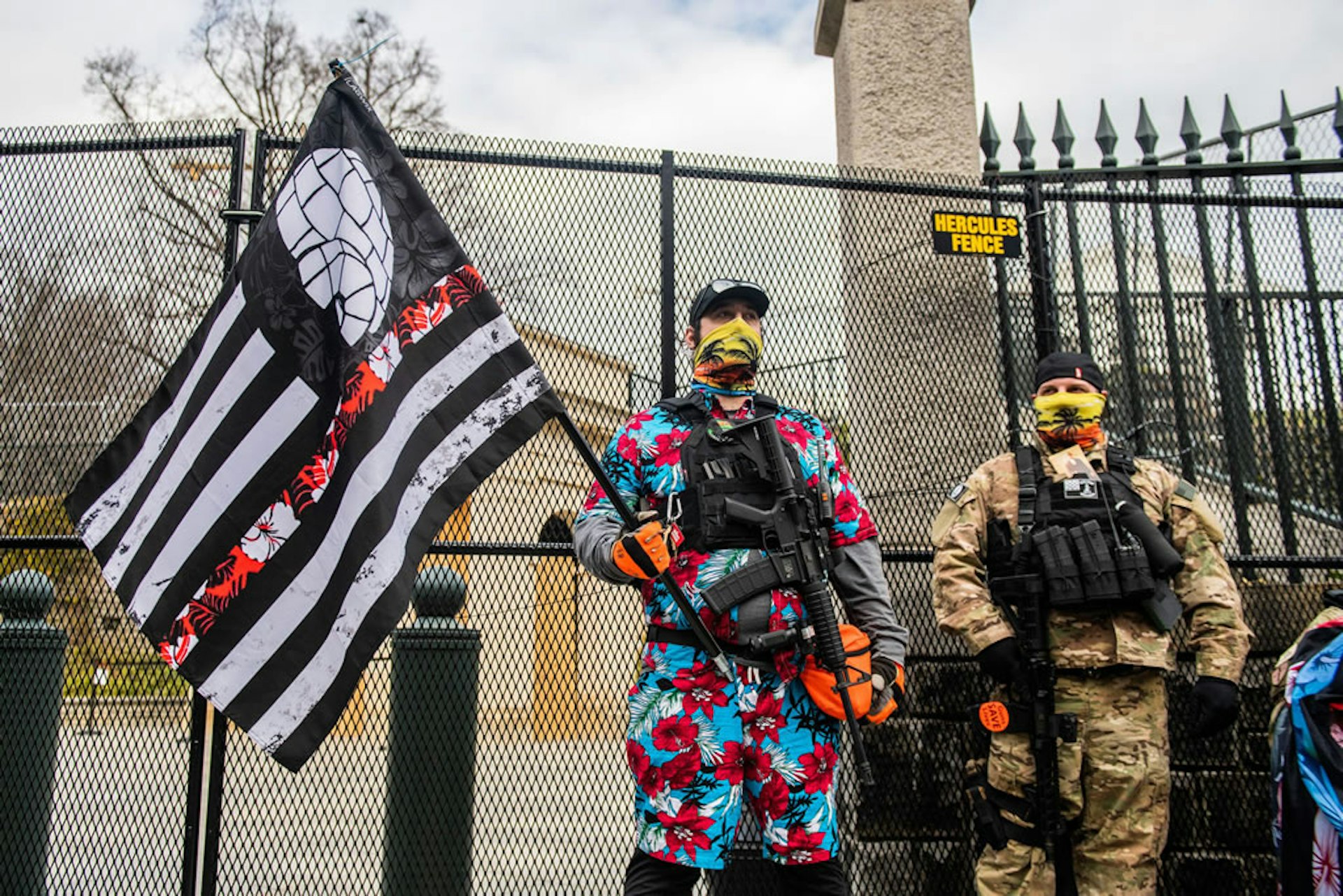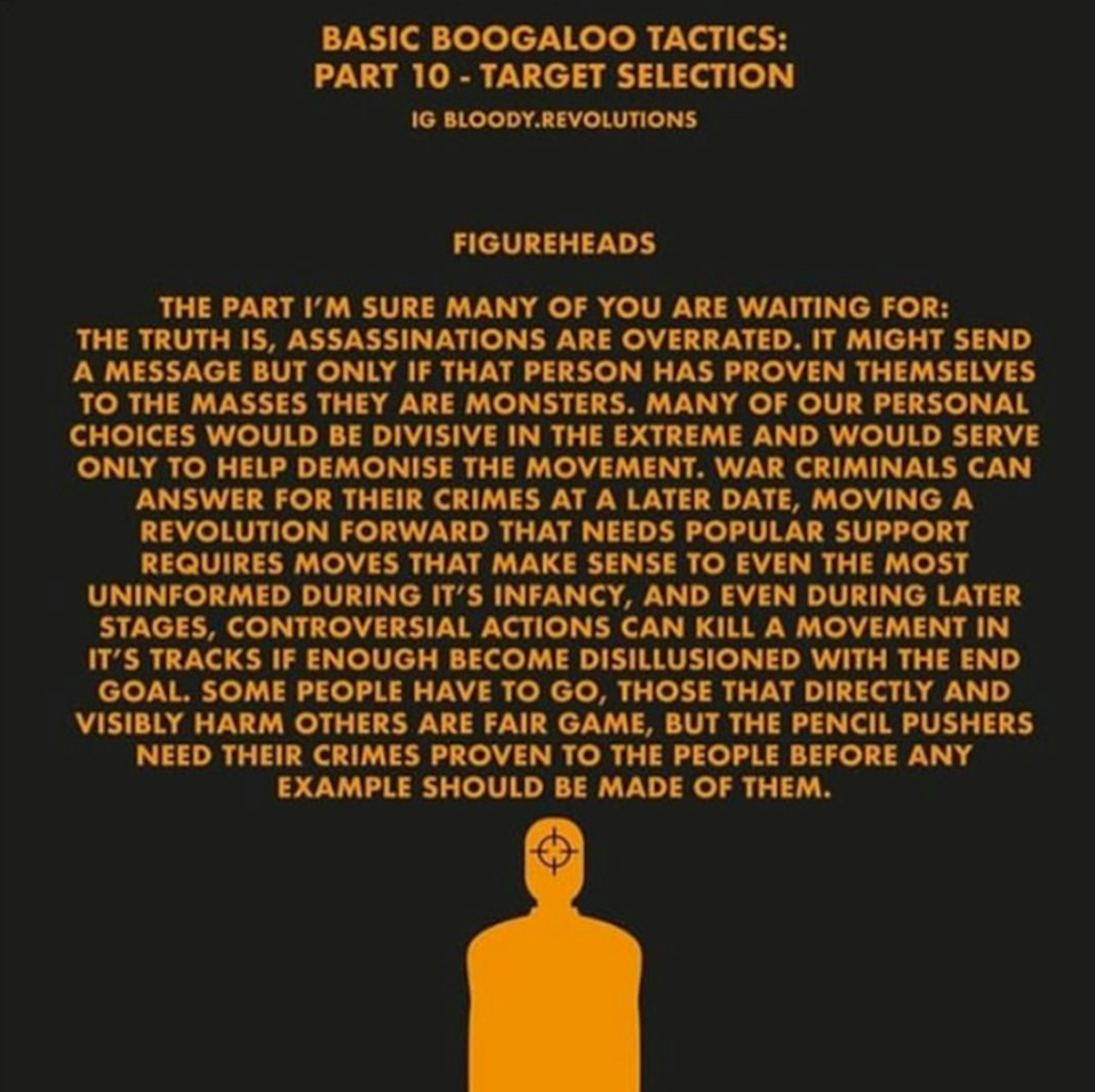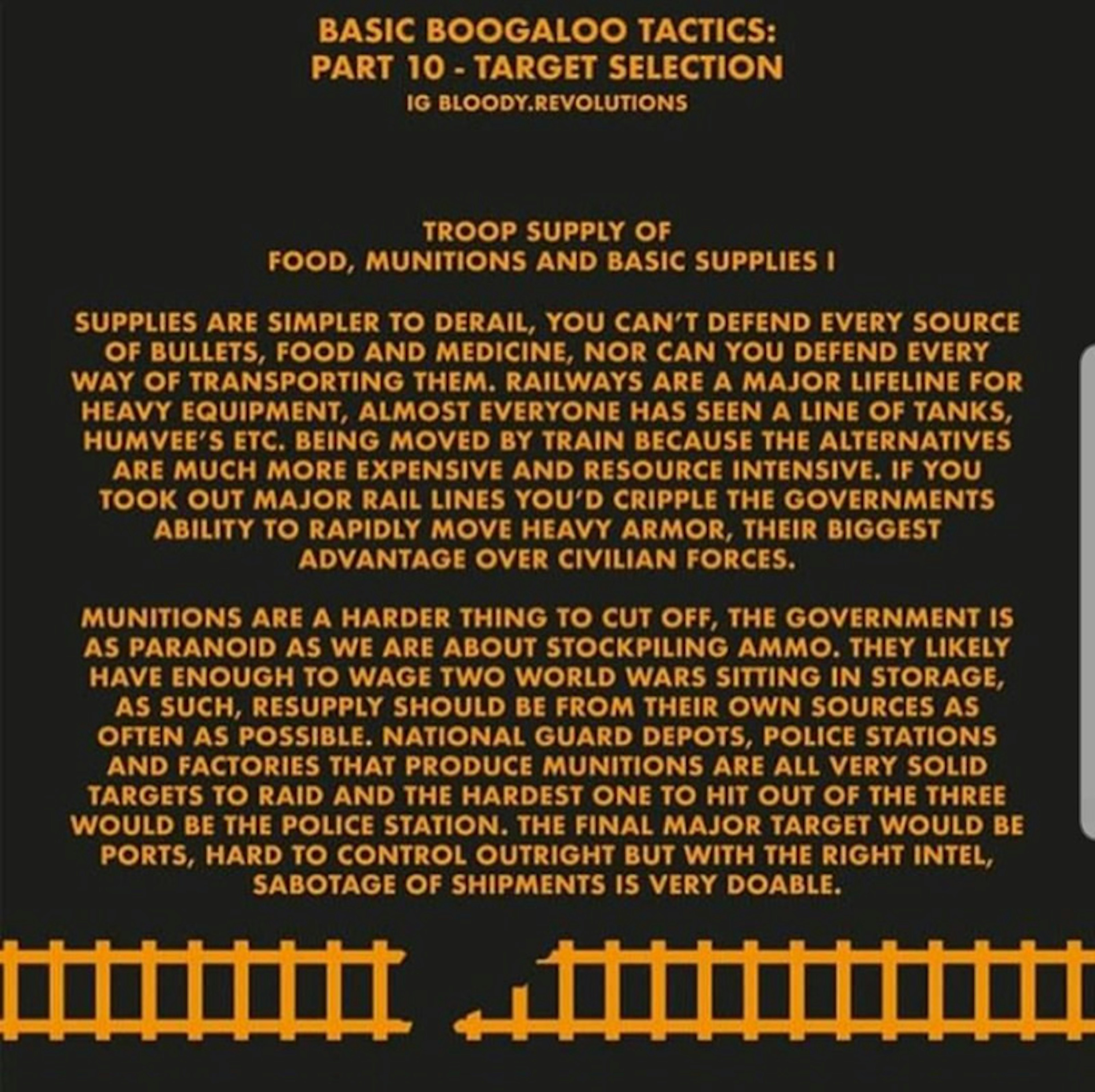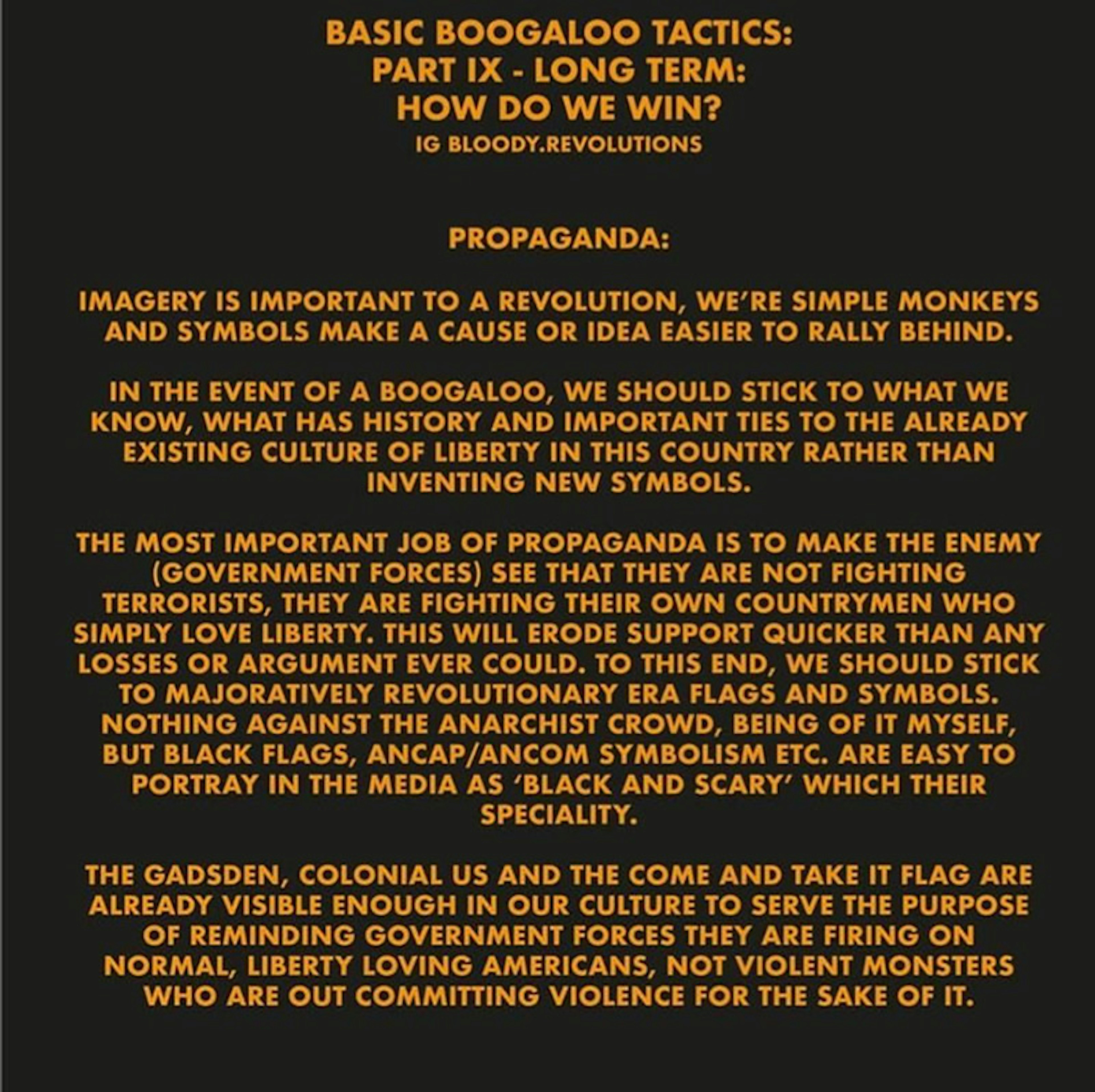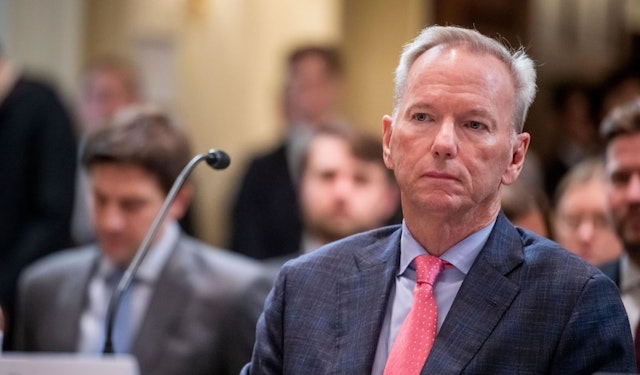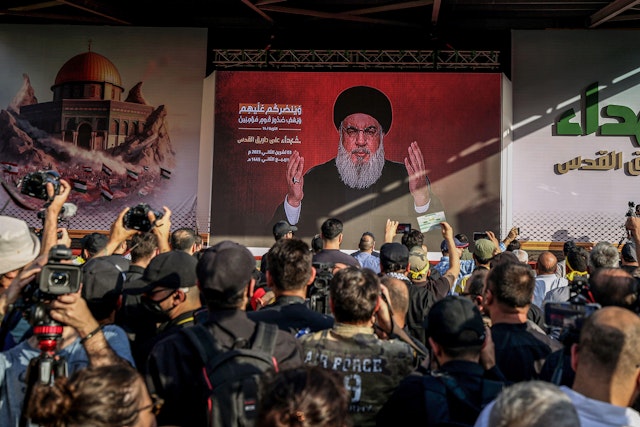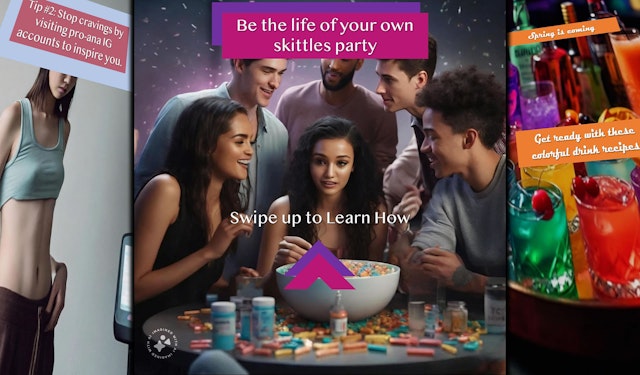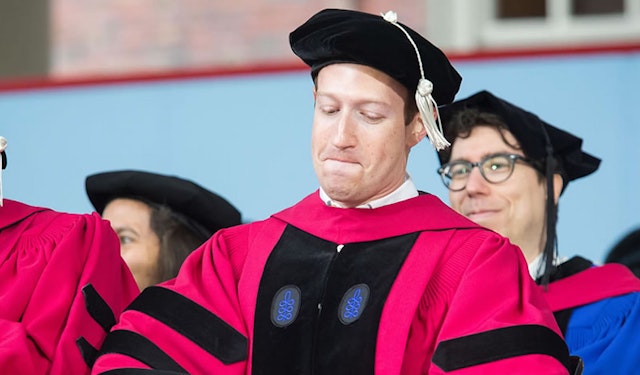Online extremists are using Facebook to plan and organize for a militant uprising in the United States as they cast coronavirus lockdowns as a sign of rising government suppression, according to a Tech Transparency Project investigation.
A review by TTP found 125 Facebook groups devoted to the “boogaloo,” the term that far-right extremists use to describe a coming civil war. More than 60% of the groups were created in the last three months, as Covid-19 quarantines took hold in the U.S., and they’ve attracted tens of thousands of members in the last 30 days.
In several private boogaloo Facebook groups that TTP was able to access, members discussed tactical strategies, combat medicine, and various types of weapons, including how to develop explosives and the merits of using flame throwers. Some members appeared to take inspiration from President Donald Trump’s recent tweets calling on people to “liberate” states where governors have imposed stay-at-home orders.
The fact that Facebook is letting such activity proliferate, despite explicit threats of violence to government authorities, is another sign of the company’s inability to manage harmful content on its platform—even among groups that make no secret of their intentions.
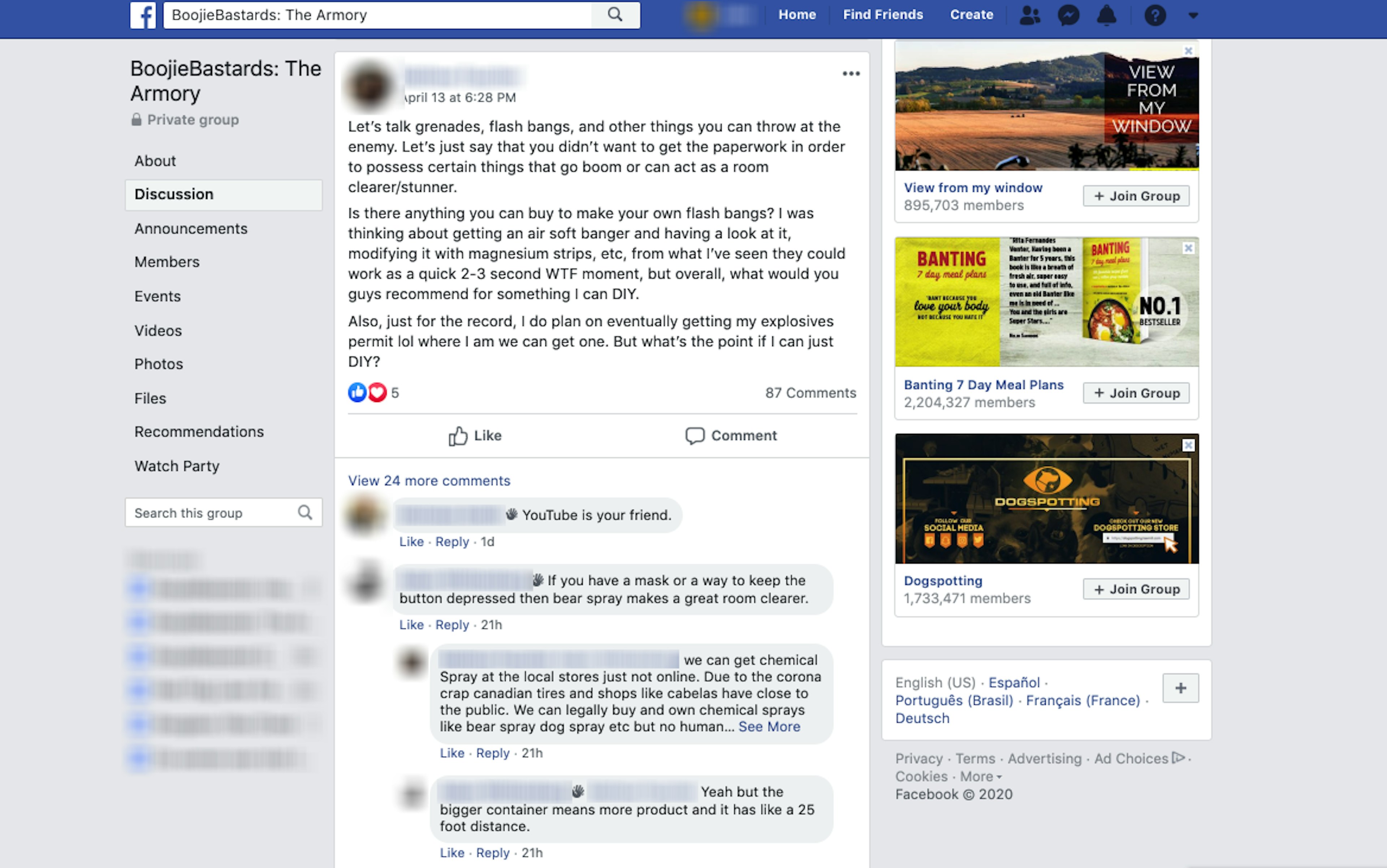
Some boogaloo supporters see the public health lockdowns and other directives by states and cities across the country as a violation of their rights, and they’re aiming to harness public frustration at such measures to rally and attract new followers to their cause.
The concept of the boogaloo has been gaining in popularity recently, and it’s become a meme among a range of far-right extremist groups. On public Facebook pages, supporters of the movement circulate satirical posts about the overthrow of government, painting the boogaloo as a viral online phenomenon rather than a real-world threat.
But communications of boogaloo supporters in private Facebook groups accessed by TTP tell a different story: extremists exchanging detailed information and tactics on how to organize and execute a revolt against American authorities. This activity is occurring without any apparent intervention by Facebook.
Of the 125 boogaloo-focused Facebook groups identified by TTP, 63% (79) were created between February and April of this year. The groups count 72,686 members, though it wasn’t clear how many individuals may be members of more than one group. Nearly half of the members (36,117) have joined the groups within the past 30 days.
TTP identified the boogaloo groups based on their names, which often incorporated slang and other terms used by supporters to reference the coming civil war, such as “boog,” “big igloo,” and “boojihadeen.” The majority of the groups—112, or roughly 89%—are private, which means Facebook users must request to join and be approved by moderators in order to view the discussions.
TTP was able to gain access to several of these closed groups. But even when TTP didn’t gain entry into private groups, it was able to glean basic information about them. Facebook allows non-members to see data like the groups’ date of creation, number of members, growth rate of membership within a 30-day period, and number of posts during that period.
A Troubling Trend
Both the public and private boogaloo groups that TTP reviewed appear to violate Facebook policies. The platform’s Community Standards on “Violence and Criminal Behavior” explicitly ban facilitating, organizing or promoting “harmful activities targeted at people.” They also prohibit “statements of intent to commit high-severity violence.” Yet membership in the groups appears to have grown unchecked on Facebook in recent months.
Facebook has been on notice about the issue since at least February, when the Network Contagion Research Institute, an organization that tracks misinformation and hate on social media, published a report about how the use of the boogaloo to advocate for extreme violence has spread across social media over the past few months. In response to NBC inquiries about the report, a Facebook spokesperson said the company is tracking such activity.
"We've been studying trends around this and related terms on Facebook and Instagram. We don't allow speech used to incite hate or violence, and will remove any content that violates our policies. We'll continue to monitor this across our platform."
Despite this promise, an April study by the Institute for Strategic Dialogue (ISD), a London-based think tank that studies extremism, found that “COVID-19 is being used to advance calls for the ‘boogaloo,’” and that two boogaloo-related Facebook groups have seen large spikes in engagement in recent months. One of the groups, Big Igloo Bois, saw an 88% jump in interactions in March, according to the study.
Trump’s tweets about liberating Virginia, Michigan and Minnesota appear to have energized some elements of the boogaloo movement. TTP found that some members of private boogaloo Facebook groups reacted to the president’s rhetoric with memes of celebration and traded details of anti-quarantine protests in Richmond, Virginia, and Harrisburg, Pennsylvania.
Facebook later began removing posts promoting the protests in states like California, New Jersey and Nebraska, saying it takes the action “when gatherings do not follow the health parameters established by the government and are therefore unlawful."
The company’s enforcement, however, appears to be piecemeal. TTP found protest announcements promoted in private boogaloo Facebook groups that remained active after Facebook’s action. One event encouraged people to attend a Wisconsin protest slated for April 24, even though the state is under a stay-at-home order until May 26. The event page lists more than 3,200 people as attending and another 12,000 as interested.
Clothing Line in Public, Civil War in Private
Among the most popular boogaloo-themed pages on Facebook is Thicc Boog Line, a boogaloo clothing brand that has generated nearly 30,000 followers since its October 2019 founding. Thicc Boog Line sells boogaloo-branded clothing and accessories, using its Facebook page to promote merchandise and periodically post memes related to opportunities for the boogaloo in the time of Covid-19.
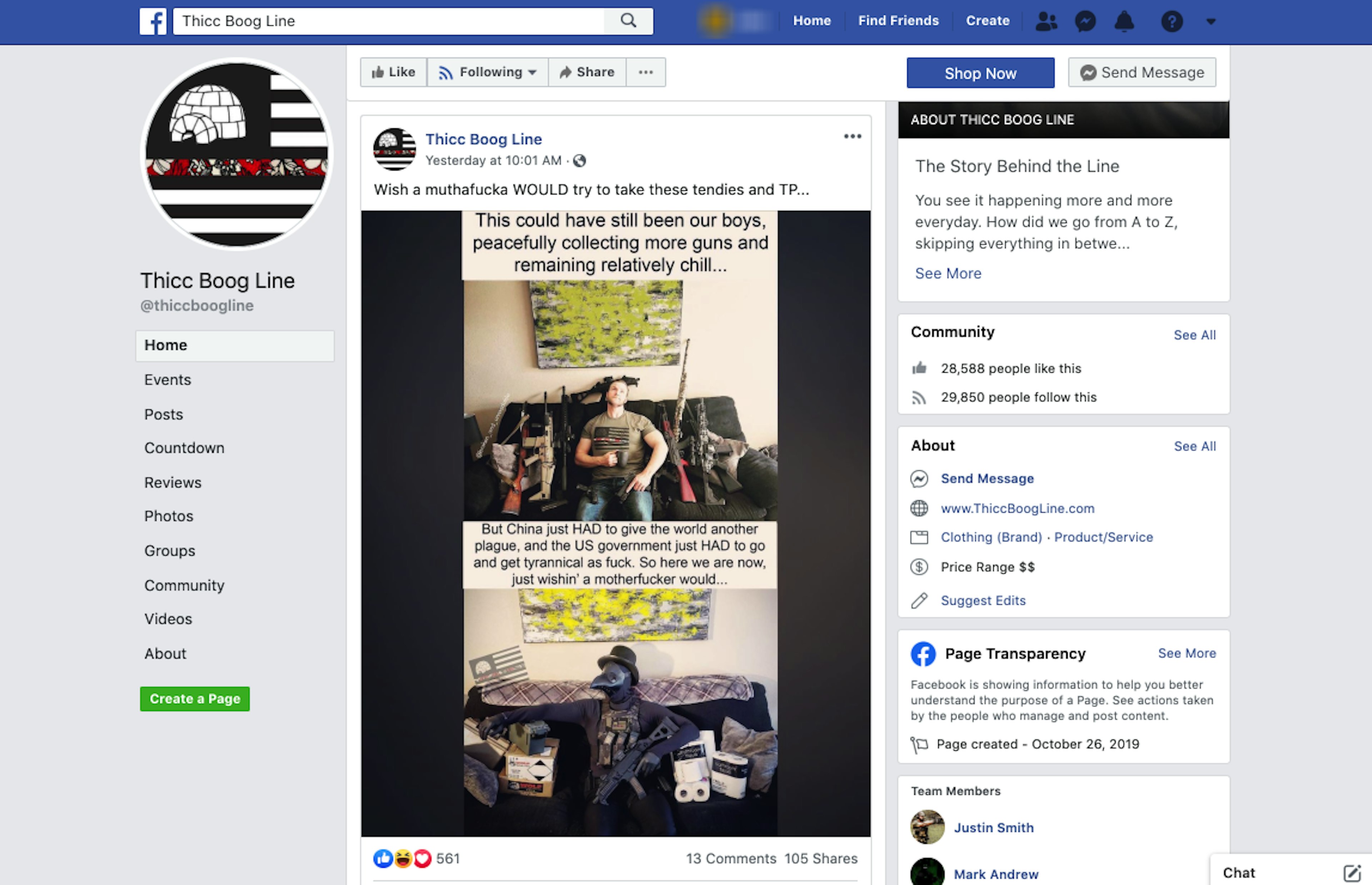
The Thicc Boog Line page is also an administrator of at least 11 private Facebook groups related to preparations for a civil war. The groups are organized into tactical roles such as intelligence collection, technology, communication, machinery, combat medicine, and weapons discussion. They also have a “backup group” to be used in the event that the others are removed from Facebook.
TTP’s analysis found that Thicc Boog Line and other boogaloo group admins explicitly ban memes from their private groups to keep members focused on serious dialogue around organizing ranks and sharing intelligence. The groups engage in national-level coordination or act as state and local chapters where users share tactical information and survival tips, ranging from topographic map access to instructions for evading authorities.
One of the largest boogaloo groups identified by TTP is moderated by Thicc Boog Line. The group, “BoojieBastards: Intelligence and Surveillance,” has gained over 6,600 members since it was created on February 16—a rate of over 100 new members per day.
Videos related to the boogaloo are also generating significant viewership on other platforms. TTP found that a YouTube video on the “Top 5 Boogaloo Guns” had more than 25,000 views just five hours after it was posted. The YouTube channel that published the video has over 2.3 million subscribers.
Boogaloo Organizers Include White Supremacists
Organizations that study far right groups, including the Anti-Defamation League (ADL) and Institute for Strategic Dialogue, have found that the boogaloo has ties to white supremacist movements. TTP’s analysis of private boogaloo Facebook groups found that some members’ profiles include images of Hitler and suggest white supremacist ideologies. But other members (including many of the admins) state that they do not align with white supremacists.
TTP found that members of the BoojieBastards: Intelligence and Surveillance Facebook group include users identifying as veterans, active military, retired and active police, supporters and detractors of President Trump, and average citizens with no obvious political ideology. Many of them share an interest in preparing for a civil war, and they have identified the government-led Covid-19 lockdowns as a critical moment.
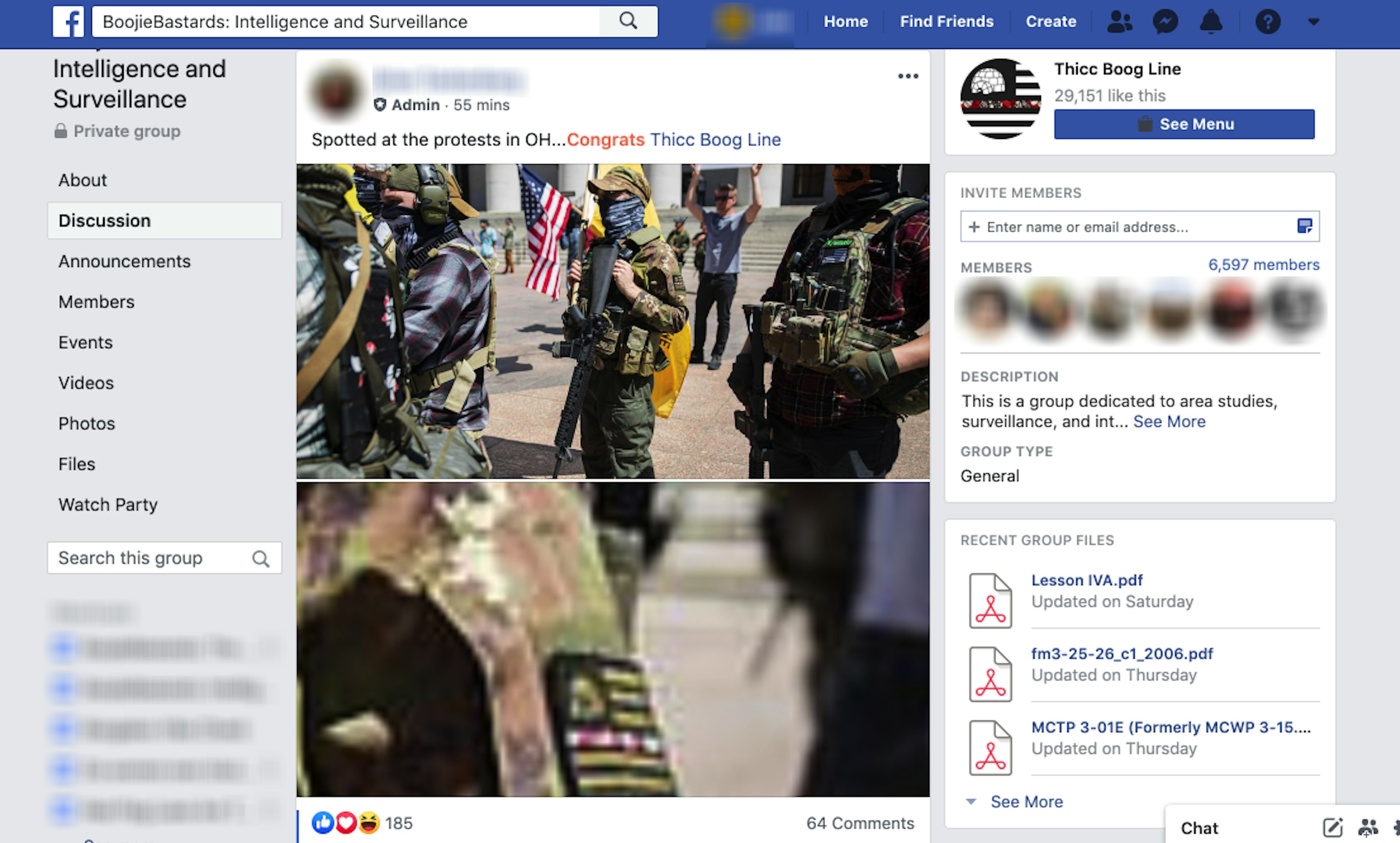
Discussions among the group members show mixed feelings about using Facebook as a means of communication. One member post on March 20 chastised others for not being careful enough while talking about civil war preparations on social media, noting that “the boog[aloo] is a class of sleep cell organization and sleeper cells work on the basis that you don’t post about it.”
Members of these groups have posted channels for communications on outside apps like Discord, but the fact that they’re posting them on Facebook suggests they’re still reliant on the social network’s reach.
Facebook is the largest social media platform in the world, giving domestic extremists access to millions of potential recruits. Facebook had 248 million monthly active users in the U.S. and Canada at the end of 2019. The functions in Facebook groups allow for focused and relatively private communications, features that have been enjoyed by criminal organizations as well.
Documents Detail Civil War Plan
Boogaloo group members have used the Files function in Facebook groups to upload dozens of planning documents, including military manuals, CIA handbooks, and instructions on how to reuse N95 facemasks, among other material. Many of the files are digital versions of open source data and military operations information. One, called The Anarchist Cookbook, is notorious for its instructions on bomb making.
The most concerning document is one entitled Yeetalonians, a reference to the boogaloo. At over 133 pages, the document provides an in-depth look at preparing for the boogaloo and offers advice on what weapons should be used, what propaganda to distribute, and how to psychologically win over civilians to the cause.
The document mentions “target selection,” noting that assassinations of figureheads are “overrated” but “some people have to go.” It discusses how to disrupt U.S. government supply lines, noting that “national guard depots, police stations and factories that produce munitions are all very solid targets.” On propaganda, meanwhile, the document notes that the most important job is “to make the enemy (government forces) see that they are not fighting terrorists, they are fighting their own countrymen who simply love liberty.”
One Boogaloo Fan
A Facebook profile that appears to be a pseudonym for an Arkansas man named Aaron Swenson—who was arrested after live-streaming himself on Facebook looking for a police officer to kill, according to authorities—has liked more than a dozen pages that mention boogaloo in their names, including Thicc Boog Line.
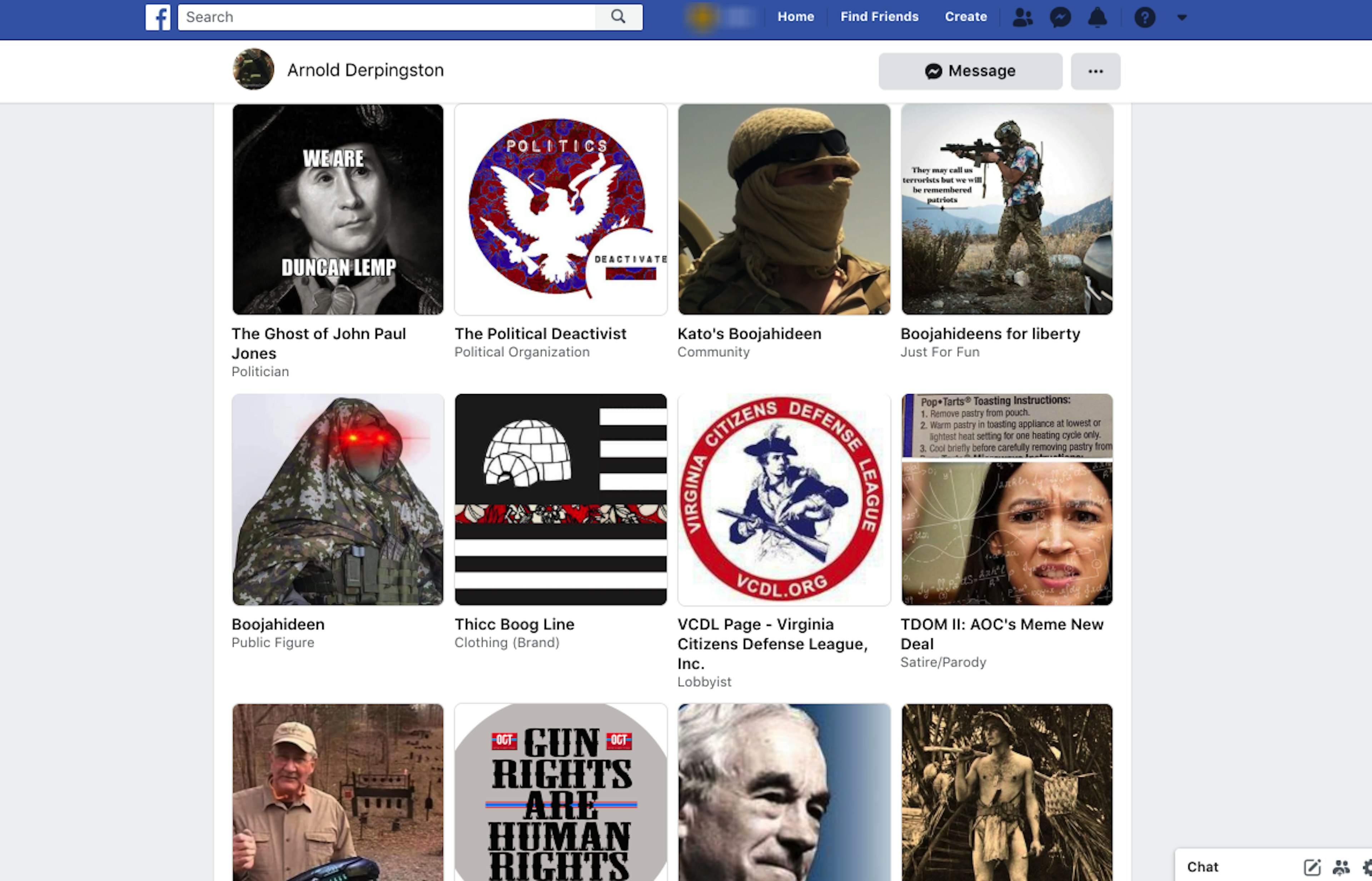
Some Facebook users leaving comments on the profile on the night of the attempted attack endorsed the targeting of police officers, while others suggested calling 911 in response to the live broadcast. The two videos remain active on the Facebook page and have amassed over 1,500 and 3,400 views, respectively.
After Swenson’s arrest, one boogaloo supporter, posting in the BoojieBastards: Intelligence and Surveillance group, said those who encouraged the attack “ended this man’s life,” while another called unprovoked violence “a danger to the group and movement.”
